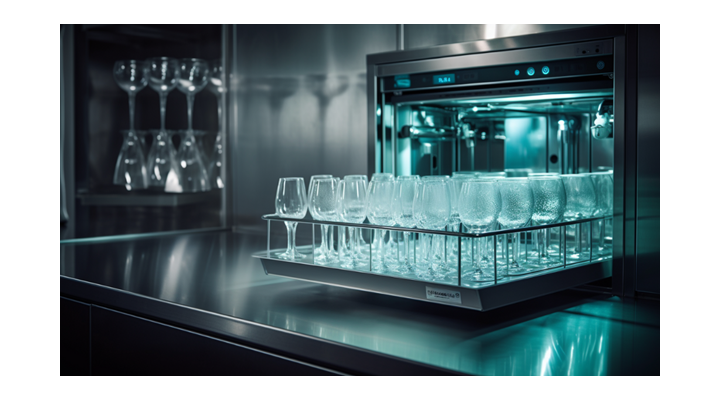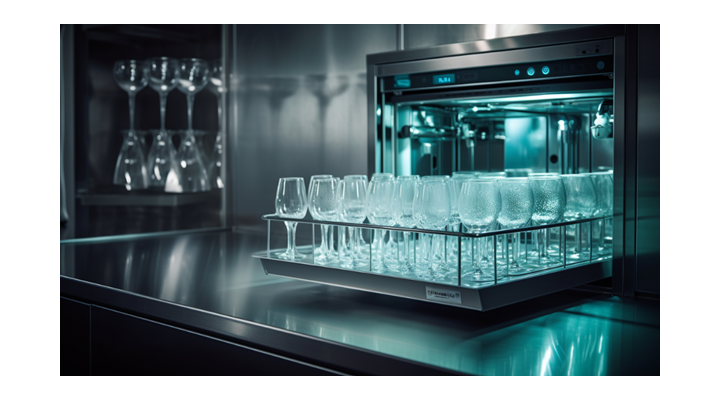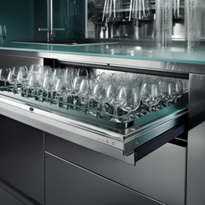Imagine a bustling restaurant kitchen, filled with skilled chefs preparing delectable dishes and attentive waitstaff serving eager customers. In the midst of this organized chaos, an essential yet often overlooked aspect of the culinary world comes into play: glassware cleaning. Clean and sparkling glassware is a crucial component of a memorable dining experience. To achieve efficiency and cost savings in this realm, many establishments are turning to a game-changing solution—under-counter glasswashers. In this article, we will explore the benefits, features, and considerations associated with undercounter glasswashers, and how they can streamline the process of cleaning glassware while saving time and money.
Why Undercounter Glasswashers Are Essential for Busy Foodservice Environments
Undercounter glasswashers are specifically designed to cater to the unique needs of busy foodservice environments. Let's explore why these machines are essential for such establishments:
1. Efficient Cleaning Process
Undercounter glasswashers provide an efficient cleaning process that significantly reduces the time and effort required to clean glassware manually. These machines are equipped with powerful jets and specialized washing programs that remove dirt, residue, and stains effectively. By automating the cleaning process, undercounter glasswashers allow staff to focus on other important tasks, improving overall productivity.
2. Quick Turnaround Time
In a bustling foodservice environment, the ability to have clean glassware readily available is crucial. Undercounter glasswashers offer a quick turnaround time, ensuring that glasses are cleaned, sanitized, and ready for use in a matter of minutes. This eliminates the need for time-consuming manual washing and drying, allowing staff to serve customers promptly.
3. Space Optimization
Space is often a constraint in busy foodservice environments. Undercounter glasswashers are compact and designed to fit seamlessly beneath countertops or bars. By utilizing the undercounter space effectively, establishments can maximize their workspace, creating a more organized and efficient environment.
4. Versatile Applications
Undercounter glasswashers are not limited to cleaning glassware alone. Many models come with adjustable racks and wash cycles that can accommodate various items, including utensils, small plates, and bar accessories. This versatility allows foodservice establishments to optimize their resources and streamline their operations.
5. Water and Energy Efficiency
Sustainability is becoming increasingly important in the foodservice industry. Undercounter glasswashers are designed with water and energy efficiency in mind. These machines use minimal amounts of water and electricity while still delivering exceptional cleaning results. By investing in undercounter glasswashers, establishments can contribute to environmental conservation efforts while saving on utility costs.
6. Enhanced Hygiene and Sanitation
Maintaining high levels of hygiene and sanitation is crucial in foodservice environments. Undercounter glasswashers utilize high-temperature wash cycles and sanitizing agents to ensure that glassware is thoroughly cleaned and free from harmful bacteria and contaminants. This reduces the risk of cross-contamination and helps establishments meet stringent health and safety standards.


Find the right Commercial Undercounter Glasswasher
Compare quotes from expert Australian suppliers and make the best choice. It's free, quick and easy!
Cost Benefits Associated With Reduced Labor, Breakage, And Manual Cleaning Requirements
Efficient operations are critical for businesses to thrive in a competitive market. Labor costs, breakage, and manual cleaning requirements are three areas that significantly impact a company's bottom line. By identifying opportunities for improvement and implementing effective strategies, organizations can reduce expenses and improve overall profitability.
Understanding Labor Costs
Labor costs encompass various elements, such as wages, benefits, training, and employee turnover. These expenses can be significant, particularly in labor-intensive industries. By reducing labor requirements through automation, streamlining processes, and enhancing employee training, businesses can achieve substantial cost savings.
The Impact of Breakage
Breakage, whether it occurs during manufacturing, packaging, or transportation, can result in financial losses for businesses. It not only affects the cost of raw materials but also leads to product waste, increased rework, and potential customer dissatisfaction. Implementing measures to minimize breakage, such as investing in high-quality packaging materials, optimizing transportation routes, and improving handling procedures, can help mitigate these costs.
Manual Cleaning and its Expenses
Manual cleaning is a labor-intensive and time-consuming task that often requires specialized equipment, cleaning agents, and personnel. It can also result in production downtime and increased wear and tear on machinery. By reducing the need for manual cleaning through automation, implementing efficient cleaning protocols, and investing in self-cleaning technologies, businesses can reduce associated expenses while ensuring optimal cleanliness and hygiene.
Automation as a Cost-Effective Solution
Automation technologies have revolutionized various industries by replacing manual labor with efficient and precise machinery. By automating repetitive and time-consuming tasks, businesses can significantly reduce labor requirements, minimize the risk of human error, and increase overall productivity. Automation also enables companies to reallocate resources to more value-added activities, improving efficiency and reducing costs in the long run.
Streamlining Processes for Efficiency
Streamlining processes is crucial for optimizing productivity and reducing costs. By identifying bottlenecks, eliminating unnecessary steps, and implementing lean manufacturing principles, organizations can achieve greater efficiency. This approach not only reduces labor requirements but also minimizes the likelihood of breakage and the need for manual cleaning, leading to significant cost benefits.
Strategies for Maximizing the Glasswasher's Capacity and Minimizing Water and Chemical Usage
Glassware cleanliness is crucial for bars, restaurants, and other establishments that serve beverages. However, traditional dishwashing methods can be resource-intensive, leading to high water and chemical usage. By implementing strategies that maximize the glasswasher's capacity and minimize water and chemical consumption, businesses can reduce costs, improve sustainability, and enhance operational efficiency.
-
Understanding the Importance of Efficiency
Efficiency is a key factor in reducing costs and optimizing operations. By maximizing the glasswasher's capacity and minimizing water and chemical usage, businesses can achieve significant savings. Moreover, efficient operations contribute to sustainability efforts by reducing environmental impact.
-
Selecting the Right Glasswasher
Choosing the appropriate undercounter glasswasher is the first step toward optimizing efficiency. Consider factors such as capacity, energy efficiency ratings, and water usage when selecting a machine. Look for models with adjustable racks and customizable wash cycles to accommodate different glassware sizes and levels of soiling.
-
Optimal Loading Techniques
Proper loading techniques can significantly impact the glasswasher's capacity and effectiveness. Train staff on how to load glassware efficiently, ensuring that items are placed securely in the racks without overcrowding. Avoid stacking glasses, as this can lead to breakage and subpar cleaning results.
-
Pre-Rinsing and Scraping
Pre-rinsing and scraping are essential to remove excess dirt and debris from glassware before loading them into the dishwasher. Encourage staff to scrape off food particles and rinse glasses with cold water to minimize the amount of grime that enters the dishwasher. This practice reduces the need for extended wash cycles and excessive detergent usage.
-
Proper Detergent and Rinse Aid Selection
Choosing the right detergent and rinse aid is crucial for effective cleaning while minimizing chemical usage. Opt for environmentally friendly and biodegradable products that are specifically formulated for glassware. Consult with suppliers or manufacturers to identify suitable options that offer excellent cleaning performance at lower concentrations.
-
Utilizing Water-Saving Features
Modern glasswashers often come with water-saving features that can significantly reduce water consumption. These features include variable spray nozzles, water pressure regulators, and sensors that optimize water usage based on load size. Ensure that these features are properly utilized and maintained to achieve maximum efficiency.
-
Routine Maintenance and Inspections
Regular maintenance and inspections are vital to keep the glasswasher functioning optimally. Follow the manufacturer's guidelines for cleaning and servicing the machine. Inspect spray arms, filters, and seals regularly to ensure they are clean and free from debris, as clogged components can reduce cleaning efficiency and increase water usage.


Find the right Commercial Undercounter Glasswasher
Compare quotes from expert Australian suppliers and make the best choice. It's free, quick and easy!
Expert Insights on Selecting Energy-Efficient Models and Implementing Sustainable Practices
In the hospitality industry, energy consumption and environmental impact are significant concerns. By selecting energy-efficient equipment modelssuch as a commercial undercounter glasswasher in Sydney and adopting sustainable practices, businesses can reduce energy usage, minimize waste, and contribute to a greener future. Let's delve into the expert insights that can guide businesses in making informed decisions and implementing sustainable initiatives.
The Importance of Energy Efficiency and Sustainability
Energy efficiency and sustainability have become critical factors in the modern business landscape. Not only do they help organizations reduce their ecological footprint, but they also present opportunities for cost savings and enhanced brand reputation. By embracing energy-efficient practices and sustainable measures, businesses can demonstrate their commitment to environmental responsibility while reaping the benefits of reduced energy expenses.
Selecting Energy-Efficient Equipment Models
When it comes to selecting equipment for the hospitality industry, energy efficiency should be a top priority. Look for appliances and machinery with high energy efficiency ratings. Consider factors such as energy consumption, standby power usage, and advanced features like automatic shut-off or energy-saving modes. Opting for energy-efficient models ensures lower operating costs and reduced environmental impact.
Energy Star Certification
One effective way to identify energy-efficient equipment is by looking for the Energy Star certification. Energy Star is a widely recognized symbol for energy efficiency, indicating that the product meets strict energy performance criteria set by the Environmental Protection Agency (EPA). Choosing Energy Star-certified equipment provides assurance that the selected models have undergone rigorous testing and meet the highest standards of energy efficiency.
Consideration of Life Cycle Costs
When evaluating equipment options, it's important to consider not only the upfront purchase price but also the long-term costs associated with the equipment's life cycle. This includes factors such as energy consumption, maintenance requirements, and potential rebates or incentives. Taking a holistic approach to cost analysis helps businesses make informed decisions that prioritize energy efficiency and sustainability.\
Optimizing Equipment Usage
Efficient equipment usage is key to maximizing energy savings. Train staff on proper equipment operation, maintenance, and energy-saving features. Encourage them to turn off equipment when not in use, optimize settings for energy efficiency, and practice proactive energy management throughout their daily routines. Regularly monitor energy usage to identify areas for improvement and provide feedback to staff.
Incorporating Sustainable Practices
Beyond equipment selection, integrating sustainable practices into everyday operations is crucial for overall energy efficiency. Here are a few areas to focus on:
Efficient Waste Management
Implement waste reduction strategies, such as recycling programs, composting, and waste audits. Minimize single-use items and encourage the use of reusable alternatives. Proper waste segregation and disposal ensure that resources are recycled or repurposed, reducing the environmental impact.
Water Conservation Measures
Water conservation is another vital aspect of sustainability. Install low-flow faucets, aerators, and water-efficient appliances. Educate staff on water-saving practices, such as reporting leaks promptly and using water responsibly. Regularly monitor water consumption and implement measures to minimize wastage.
Staff Training and Awareness
Training and awareness programs play a pivotal role in fostering a sustainable culture within the organization. Educate staff on the importance of energy efficiency and sustainability, and provide them with the knowledge and tools to incorporate sustainable practices into their daily routines. Regularly communicate updates, achievements, and goals to keep sustainability at the forefront of the organizational mindset.
Monitoring and Continuous Improvement
Implement monitoring systems to track energy usage, waste generation, and water consumption. Analyze the data to identify trends, anomalies, and areas for improvement. Set realistic targets and establish a culture of continuous improvement, where sustainable practices are regularly evaluated, refined, and expanded upon.
Embracing energy efficiency and sustainability is not only beneficial for the environment but also for the long-term success of businesses in the hospitality industry. By selecting energy-efficient equipment models, incorporating sustainable practices, and fostering a culture of environmental responsibility, organizations can reduce their ecological footprint, lower operating costs, and enhance their reputation as socially responsible entities.





-160x160-state_article-rel-cat.png)
-205x205.png)


